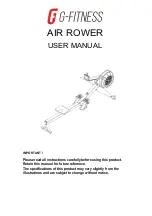
Lake Shore Model 370 AC Resistance Bridge User’s Manual
CHAPTER 6
COMPUTER INTERFACE OPERATION
6.0 GENERAL
This chapter provides operational instructions for the computer interface for the Lake Shore Model 370 AC Resistance
Bridge. Either of the two computer interfaces provided with the Model 370 permit remote operation. The first is the
IEEE-488 Interface described in Paragraph 6.1. The second is the Serial Interface described in Paragraph 6.2. The two
interfaces share a common set of commands detailed in Paragraph 6.3. Only one of the interfaces can be used at a time.
6.1 IEEE-488
INTERFACE
The IEEE-488 Interface is an instrumentation bus with hardware and programming standards that simplify instrument
interfacing. The Model 370 IEEE-488 Interface complies with the IEEE-488.2-1987 standard and incorporates its
functional, electrical, and mechanical specifications unless otherwise specified in this manual.
All instruments on the interface bus perform one or more of the interface functions of TALKER, LISTENER, or BUS
CONTROLLER. A TALKER transmits data onto the bus to other devices. A LISTENER receives data from other
devices through the bus. The BUS CONTROLLER designates to the devices on the bus which function to perform.
The Model 370 performs the functions of TALKER and LISTENER but cannot be a BUS CONTROLLER. The BUS
CONTROLLER is the digital computer which tells the Model 370 which functions to perform.
Below are Model 370 IEEE-488 interface capabilities:
•
SH1:
Source handshake capability.
•
RL1:
Complete remote/local capability.
•
DC1:
Full device clear capability.
•
DT0:
No device trigger capability.
•
C0:
No system controller capability.
•
T5:
Basic TALKER, serial poll capability, talk only, unaddressed to talk if addressed to listen.
•
L4:
Basic LISTENER, unaddressed to listen if addressed to talk.
•
SR1:
Service request capability.
•
AH1:
Acceptor handshake capability.
•
PP0:
No parallel poll capability.
•
E1:
Open collector electronics.
NOTE
: The Model 370 IEEE-488 Interface requires that repeat addressing be enabled on the bus controller.
Instruments are connected to the IEEE-488 bus by a 24-conductor connector cable as specified by the standard.
Refer to Paragraph 8.11.2. Cables can be purchased from Lake Shore or other electronic suppliers. A connector extender
(Model 4005) is required to use the IEEE-488 Interface and the ALARM RELAYS terminal block at the same time.
Cable lengths are limited to 2 meters for each device and 20 meters for the entire bus. The Model 370 can drive bus with
up to 10 loads. If more instruments or cable length is required, a bus expander must be used.
6.1.1
Changing IEEE-488 Interface Parameters
Two interface parameters. address and terminators, must be set from the front panel before communication with the
instrument can be established. Other interface parameters can be set via the interface using the device specific commands
provided in Paragraph 6.3.
Remote Operation
6-1
















































